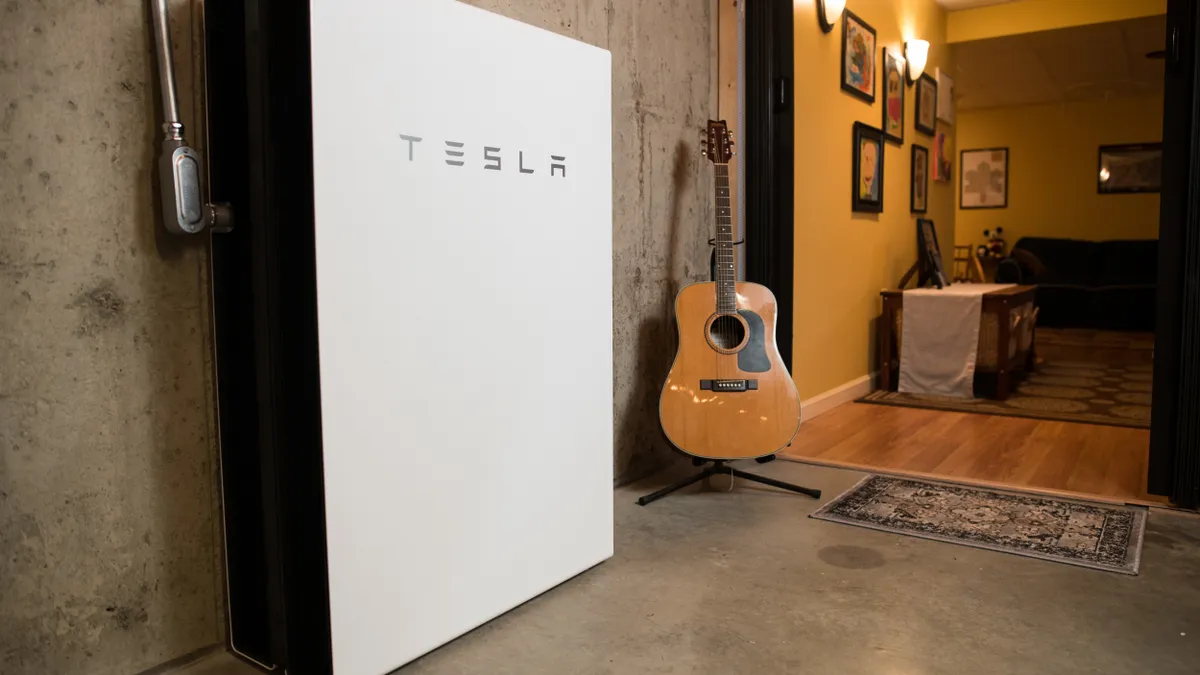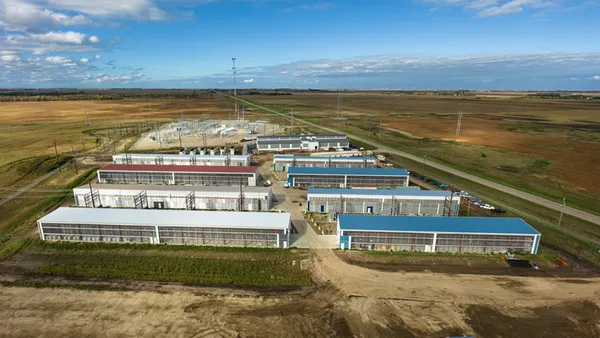Dive Brief:
- Vermont's only investor-owned utility, Green Mountain Power (GMP), introduced a pilot on Tuesday to use battery storage systems as meters, in order to provide a clean back-up power source and energy savings.
- GMP, which has partnered with Tesla for years, has a vision to have batteries in every home. The pilot includes 250 customers enrolled with the utility and 250 customers enrolled with third-party vendors, using GMP's Bring-Your-Own-Device incentives, to add two Tesla Powerwall battery systems per customer.
- The utility is working on testing the Resilient Home pilot for 18 months, filing updates along the way. GMP aims to test other batteries to use as meters in the future.
Dive Insight:
Energy storage batteries have a lot of capabilities and using them as meters helps to increase their value, justify their costs and ultimately advance their deployment.
States like Massachusetts and New York have set storage deployment targets as part of wider clean energy goals. For GMP's part, the potential of adding batteries to every residence and include capabilities to measure energy usage, which the utility is attempting to patent, would help them manage peak loads while enabling the deployment of renewable resources onto the grid.
"All of these things are in concert with [GMP] moving toward our goal of being 100% carbon free by 2025 and 100% percent renewable by 2030," Mary Powell, GMP's CEO, told Utility Dive. "It's been many years that we've been working on what we call a complete energy transformation to a community-, home- and business-based energy system versus the bulk delivery system that we've known for ... over a hundred years."
The GMP offer, which has received calls requests from more than 1,000 customers for participation since the April 30 launch, would charge customers $30/month for two Powerwall batteries. For comparison, Liberty Utilities' battery program is $25/month per battery for 10 years.
Depending on the success of this program, GMP will craft a tariff and offer Resilient Home to all customers, according to Kristin Kelly, GMP spokesperson.
The program comes amid multiple utility efforts to get costly grid modernization plans approved by regulators. Public utility commissions in states like Virginia and Kentucky have rejected plans for adding smart meters or advanced metering infrastructure (AMI), citing concerns about cost and net benefits.
GMP began to look at battery systems as a means to upend the current metering model, Powell said.
"I felt like I had an 'a-ha' moment when we were talking about all the functionality of what a storage device in a home could do," she said. Given its metering capabilities, "why would we even want all this extra equipment on homes and businesses?"
GMP's patent-pending system could be applied by other utilities and help make meters moot, Powell said. GMP worked to develop the capability to read energy consumption data through the Powerwall system.
"We still need AMI to move forward with a lot of innovative things," Lon Huber, energy director at Navigant Consulting, told Utility Dive. Huber helped design Liberty's Tesla residential storage program.
Participants also receive the option of a monthly flat fee locked in for up to a year for their energy usage, which the utility measures through the battery systems.
The flat fee is based on nine fixed price levels, reset annually based on your usage in the previous year. The price is designed to encourage efficiency and energy savings while countering the volatility of monthly pricing driven by heat waves and cold weather in the state. Vermont has up to three months of predictable energy use per year, during fall and springtime, according to Powell.
Tesla is one of GMP's longest-standing partnerships, since the announcement of the Powerwall, Powell said. The utility has already installed Powerwall batteries in its service area, in part for peak shaving. Green Mountain Power said it saved ratepayers $500,000 by reducing peak demand during a heat wave last July by calling on about 500 Powerwall batteries.
That program is expected to save customers up to $3 million across its lifetime.















